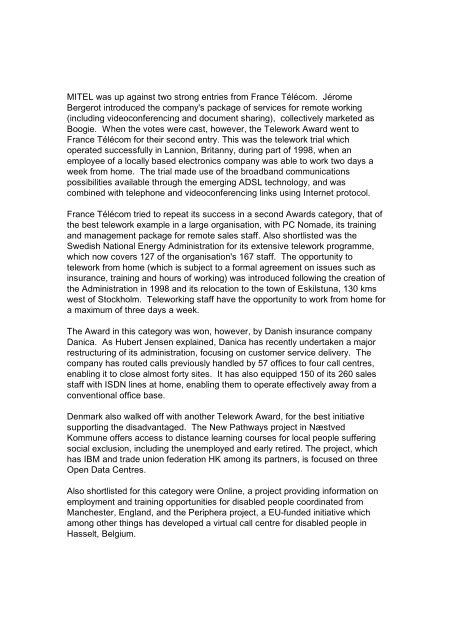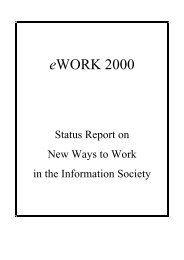Telework Award Winners - European Telework Week
Telework Award Winners - European Telework Week
Telework Award Winners - European Telework Week
You also want an ePaper? Increase the reach of your titles
YUMPU automatically turns print PDFs into web optimized ePapers that Google loves.
MITEL was up against two strong entries from France Télécom. Jérome<br />
Bergerot introduced the company's package of services for remote working<br />
(including videoconferencing and document sharing), collectively marketed as<br />
Boogie. When the votes were cast, however, the <strong>Telework</strong> <strong>Award</strong> went to<br />
France Télécom for their second entry. This was the telework trial which<br />
operated successfully in Lannion, Britanny, during part of 1998, when an<br />
employee of a locally based electronics company was able to work two days a<br />
week from home. The trial made use of the broadband communications<br />
possibilities available through the emerging ADSL technology, and was<br />
combined with telephone and videoconferencing links using Internet protocol.<br />
France Télécom tried to repeat its success in a second <strong>Award</strong>s category, that of<br />
the best telework example in a large organisation, with PC Nomade, its training<br />
and management package for remote sales staff. Also shortlisted was the<br />
Swedish National Energy Administration for its extensive telework programme,<br />
which now covers 127 of the organisation's 167 staff. The opportunity to<br />
telework from home (which is subject to a formal agreement on issues such as<br />
insurance, training and hours of working) was introduced following the creation of<br />
the Administration in 1998 and its relocation to the town of Eskilstuna, 130 kms<br />
west of Stockholm. <strong>Telework</strong>ing staff have the opportunity to work from home for<br />
a maximum of three days a week.<br />
The <strong>Award</strong> in this category was won, however, by Danish insurance company<br />
Danica. As Hubert Jensen explained, Danica has recently undertaken a major<br />
restructuring of its administration, focusing on customer service delivery. The<br />
company has routed calls previously handled by 57 offices to four call centres,<br />
enabling it to close almost forty sites. It has also equipped 150 of its 260 sales<br />
staff with ISDN lines at home, enabling them to operate effectively away from a<br />
conventional office base.<br />
Denmark also walked off with another <strong>Telework</strong> <strong>Award</strong>, for the best initiative<br />
supporting the disadvantaged. The New Pathways project in Næstved<br />
Kommune offers access to distance learning courses for local people suffering<br />
social exclusion, including the unemployed and early retired. The project, which<br />
has IBM and trade union federation HK among its partners, is focused on three<br />
Open Data Centres.<br />
Also shortlisted for this category were Online, a project providing information on<br />
employment and training opportunities for disabled people coordinated from<br />
Manchester, England, and the Periphera project, a EU-funded initiative which<br />
among other things has developed a virtual call centre for disabled people in<br />
Hasselt, Belgium.








